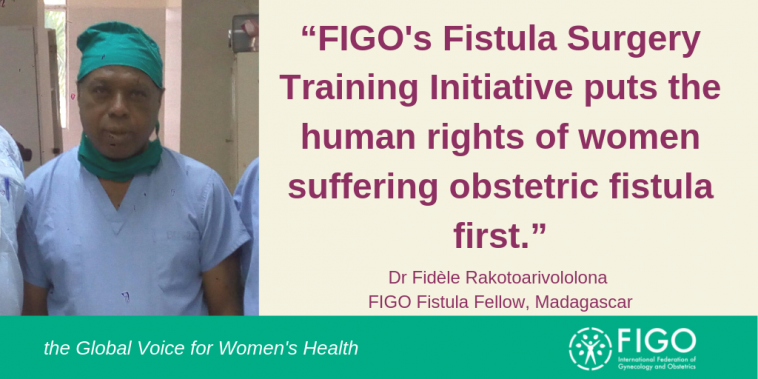In Madagascar, stories of fistula can make a difference

Obstetric fistula is a devastating childbirth injury, and a neglected public health and human rights issue.
2 million women in low-resource settings have an obstetric fistula, and up to 100,000 develop one every year. Leaking urine and / or faeces and living in despair on the margins of their own life, only 1 in 50 will ever receive treatment.
FIGO Fellows, trainee fistula surgeons from some of the world’s most underserved regions, are committed to closing this gap in care. Dr Fidèle Rakotoarivololona, from Sambava Hospital in Madagascar, shares his story.
The 58 FIGO Fellows have now collectively performed 9,000 fistula repairs. To me, this means that FIGO's programme is a success: most importantly because it puts the human rights of women suffering obstetric fistula first.
Unfortunately, given the current situation, I do not think I will see the end of obstetric fistula in my own lifetime. There are always new cases - since the beginning of the year, I have treated six.
One of the first patients I ever helped was Mahafaly*, 42, who had lived with her fistula for 22 years. She was an outcast in her community, she told me. No one wanted to come near her because she smelled of urine. She isolated herself at home. She only went out a little, with her husband - happily, he had stood by her during these 22 years of suffering - but no surgeon wanted to attempt a repair, because her case was so complicated.
One Sunday in 2012, she came to Sambava Regional Reference Hospital. I was on duty that day, and she confided her story in me. After assessing her case, I explained that we could treat her fistula. As soon as she heard this she was so happy, her face lit up.
Then came the day of her surgery. As Mahafaly entered the operating room, before climbing onto the table, she knelt down and prayed. This touched me a lot, and since that time, I have dedicated my career to treating women who suffer from obstetric fistula.
Women who have had a successful fistula repair have an opportunity to resume their lives with dignity and hope. Their stories are the most powerful tool we have to attract attention to this issue, to help in some significant way those women who will still suffer from obstetric fistula in the future.
Obstetric fistula must no longer be neglected in public health. We need to prevent the causes: geographical distance from health centres, lack of skilled health personnel, socio-cultural and economic factors. And we must provide surgeries for those women who suffer.
For a woman living with obstetric fistula, a successful repair surgery is liberation. She no longer suffers the constant leak of urine, she can return to live normally in her village. She can take back her life.
Maternal mortality is addressed in the 2030 Sustainable Development Agenda but maternal morbidity is not, even though it is a greater burden. Saving a woman from death and leaving her incontinent, isolated and devastated is not life-saving: it is a human rights violation.
On the International Day to End Obstetric Fistula, it’s time that obstetric fistula was brought back to the forefront of global conversation, to ensure that no woman is left behind. #EndFistula
* Name changed